Kelp
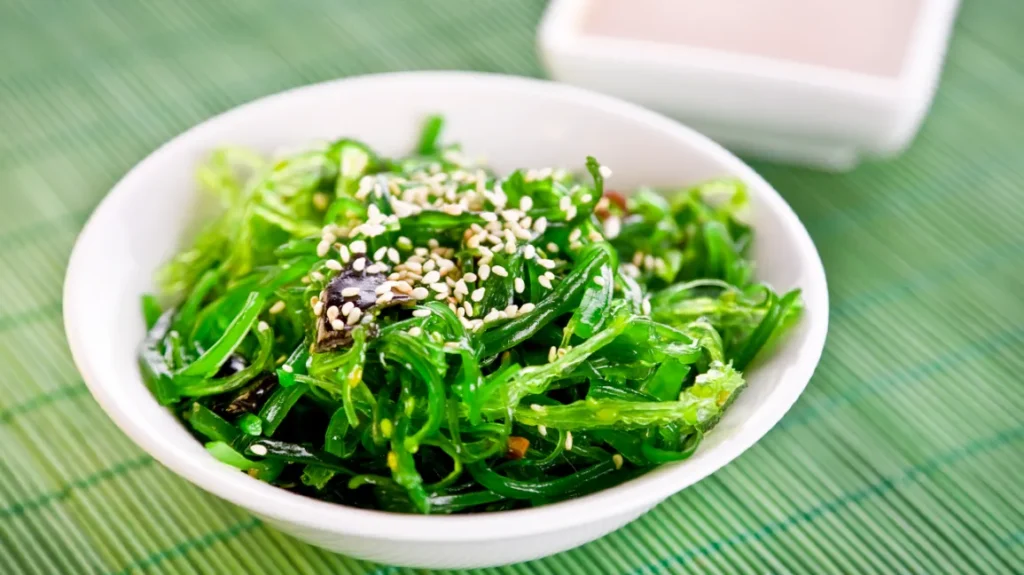
Kelp is a type of large brown seaweed that grows in underwater forests in shallow ocean waters. It is known for its high nutrient content and is often used in culinary dishes, health supplements, and beauty products. Kelp is particularly valued for its rich iodine content, which supports thyroid health.
Size
- Kelp can grow up to 150 feet (45 meters) in length, making it one of the largest seaweeds in the world.
- The blades of kelp can be wide, typically ranging from a few inches to over a foot across.
Color
- Kelp typically exhibits a greenish-brown color, which can vary slightly depending on the species and environmental conditions.
- In certain lights, kelp can also show golden hues, especially when it floats near the water’s surface.
Texture
- Kelp has a smooth, slightly slimy texture, which helps it resist drying out when exposed to the air at low tide.
- The blades are flexible, allowing the plant to move with the ocean currents without breaking.
Fragrance
- Kelp has a distinct oceanic aroma, reminiscent of the sea, which is both salty and fresh.
- The fragrance also includes earthy undertones, adding to its rich, natural scent.
Uses
- Kelp is widely used in Asian cuisine, particularly in dishes like soups, salads, and sushi. It is also a key ingredient in the production of alginate, a thickening agent.
- Rich in iodine, kelp is used in supplements to support thyroid function. It is also valued for its high levels of vitamins, minerals, and antioxidants.
- Kelp is often included in skincare products for its hydrating and anti-aging properties. It is also used in hair care products to strengthen and nourish hair.
Habitat
- Kelp thrives in cold, nutrient-rich waters, typically along rocky coastlines. It is commonly found in the Pacific Ocean, particularly along the coasts of North America.
- Kelp forms dense underwater forests, creating a unique and biodiverse habitat for marine life.
Cultural Significance
- Kelp has been used in traditional medicine for centuries, particularly in Asian cultures, for its health benefits.
- It is considered a sustainable resource, as it grows rapidly and helps absorb excess nutrients from the ocean, improving water quality.
Spiritual Properties
- Purification: Kelp is often associated with purification and cleansing, both physically and spiritually. It is believed to help cleanse negative energies and promote balance.
- Connection to the Ocean: Kelp represents a deep connection to the ocean and the flow of life. It is used in rituals to invoke the power and calm of the sea.
- Abundance and Growth: Due to its rapid growth and ability to thrive in challenging conditions, kelp symbolizes abundance, resilience, and growth.
Medicinal Properties
- Thyroid Health: Kelp is an excellent source of iodine, which is essential for healthy thyroid function. Regular consumption of kelp can help prevent iodine deficiency and support metabolic health.
- Detoxification: Kelp contains alginate, a compound that helps detoxify the body by binding to heavy metals and toxins and aiding in their elimination.
- Bone Health: Rich in calcium and magnesium, kelp supports bone health and can help prevent osteoporosis. It also provides essential vitamins like Vitamin K, which is important for bone metabolism.
- Anti-Inflammatory: Kelp has anti-inflammatory properties, making it useful for reducing inflammation in the body. It may help alleviate symptoms of arthritis and other inflammatory conditions.
Adverse Actions & Side Effects
- Allergic Reactions: Some individuals may experience allergic reactions to kelp, such as skin irritation, itching, or rashes. Those with known seaweed allergies should avoid using kelp.
- Thyroid Overactivity: Excessive consumption of kelp can lead to hyperthyroidism due to its high iodine content, especially in individuals with pre-existing thyroid conditions.
Side Effects
- Gastrointestinal Issues: Overconsumption of kelp may cause digestive discomfort, including bloating, gas, or diarrhea. It is important to consume kelp in moderation to avoid these side effects.
- Heavy Metal Contamination: Kelp can absorb heavy metals from the water, which can lead to potential contamination if sourced from polluted waters. Always ensure that kelp is sourced from clean, reputable suppliers.
- Blood Clotting: Due to its high Vitamin K content, kelp may interfere with blood-thinning medications, increasing the risk of blood clotting. Individuals on such medications should consult with a healthcare provider before using kelp.
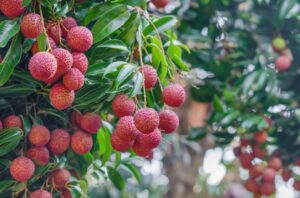
Lychee Berries
Lychee Berries Lychee Berries are tropical fruits known for their sweet flavor and distinctive appearance. They are highly valued in culinary applications and traditional medicine
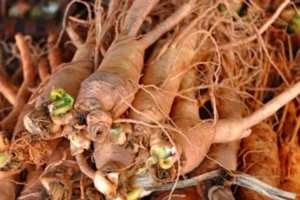
Eleuthero Root
Eleuthero Root Eleuthero Root, also known as Siberian Ginseng (Eleutherococcus senticosus), is a renowned adaptogenic herb that has been used for centuries in traditional medicine,
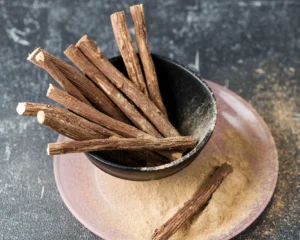
Licorice Root
Licorice Root Licorice Root is a perennial herb renowned for its sweet flavor and numerous health benefits. It has been used in traditional medicine for
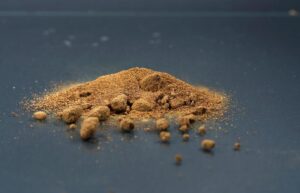
Frankincense Powder
Frankincense Powder Frankincense Powder, derived from the resin of the Boswellia tree, is a revered substance with a long history of use in spiritual, medicinal,
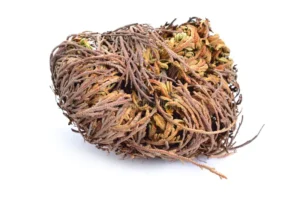
Jericho
Jericho Jericho, also known as Rose of Jericho or Anastatica hierochuntica, is a fascinating plant known for its remarkable resurrection abilities and distinctive appearance. This
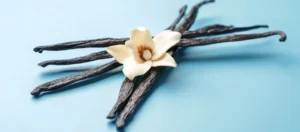
Vanilla Bean
Vanilla Bean Vanilla Bean is the fruit of the tropical orchid Vanilla planifolia, native to Mexico and now cultivated in various tropical regions around the